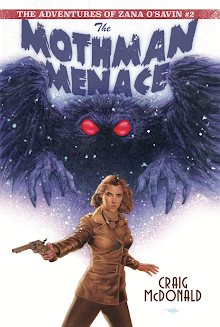Every novel I've composed has a kind of "soundtrack."
 In most cases, it's just a playlist I put together and play relentlessly to help set and sustain a mood across the composition of a full first draft.
In most cases, it's just a playlist I put together and play relentlessly to help set and sustain a mood across the composition of a full first draft.
But for THREE CHORDS & THE TRUTH (now available via Betimes Books), set against the 1958 (G)Nashville music scene, many of the songs I was listening to in order to stay "in period" and in mood went straight into the final text.
Here's an opening tune by its original artist from THREE CHORDS. This song by Conway Twitty is playing in an all-night diner down South near the novel's opening. This particular version was recorded not long before Mr. Twitty passed, but it's done in 1950s style, and I kind of dig the passion he brings to this version:
Next up is the Everly Brothers and another song popular during the period in which the novel unfolds. Hector, a certain returning sidekick from HEAD GAMES, and company, hear this one in a Nashville watering hole:
In that same bar, we get some classic Jim Reeves (We also learn Hector himself does a mean cover of another song Reeves made famous, "Distant Drums.") Here are both tunes featured in THREE CHORDS, as sung by the man himself.
Next up is Marty Robbin's '58 tune, "The Story of My Life." Though Marty's been mentioned before in the Lassiter novels (HEAD GAMES comes to mind), this song's lyrics seem particularly apt for a novelist who (in)famously lives what he writes, and writes what he lives.
"Stop the World and Let Me Off" is an old (G)Nashville classic. Strictly speaking, this isn't the cut Hector and Bud Fiske and company would have heard back in real-time in fifty-eight, but, hey, I just far prefer Hag's version. (Waylon Jennings recorded a great cover of this one, too.)
This Johnny Cash classic sets up some critical plot aspects of THREE CHORDS & THE TRUTH. The Man in Black's late-1950's prison visits, and Hector's tagging along for a few of those gigs, drives much of the climax to the Hector Lassiter series, and certain racial tensions there-in.
(Those last are sadly much more timely now than they were when I wrote CHORDS nearly a decade ago, in Nashville and in Gatlinburg, also tragically recently in the news.)
We conclude the soundtrack "in print" with this Roy Orbison tune.
HEAD GAMES made a rather provocative time jump that became a talking point for many readers and critics. Some loved it; some not so much.
But a similar leap happens in CHORDS (got to have the courage of your convictions!), one I tried to help finesse/telepgraph by subtly referencing this tune by the Sun Records recording star who bridged so many decades ala stablemate Johnny Cash.
This likely would have been one of the last tunes old Roy recorded...
Next time: The "invisible" or "inaudible" soundtrack.





































